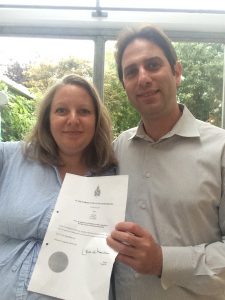August 22, 2017
Legal fight for different-sex civil partnerships to go to the Supreme Court
Another “significant step in the journey to achieve equal civil partnerships for all” has been made, as the couple the heart of the effort to open civil partnerships to different-sex couples are granted permission to take their legal fight to the UK Supreme Court.

Ms Steinfeld and Mr Keidan with the Court’s Permission
Rebecca Steinfeld and Charles Keidan, who sought to register a civil partnership but were denied because they are ‘not of the same sex,’ took the government to court in 2014 over the ongoing ban on different-sex civil partnerships.
Steinfeld and Keidan, who are shortly expecting their second child, wish to form a civil partnership because it “captures the essence of our relationship and values”. They see civil partnerships are a simple, modern contract conferring almost identical rights and responsibilities as marriage, but without its social pressures.
A ruling in February 2017 from the Court of Appeal stated that the current ban could not continue indefinitely but, in a 2:1 split ruling, gave the government limited time to decide on the future status of civil partnerships.
The couple said they “welcomed” the Supreme Court’s decision to grant permission to hear their case and hope that with even more time having elapsed with no government action, the court will find in their favour and force the government to act.
Rebecca Steinfeld said:
“Nearly a year after saying in court that they needed more time, the government still has not publicly changed its position on the issue. Having received a very encouraging ruling from the Court of Appeal in February we are confident that our case is sound. We hope the Supreme Court will deliver a judgment that will finally provide access to civil partnerships for thousands of families across the country.”
Charles Keidan said:
“The incredible support from many thousands of people who have signed our petition and backing from MPs across the political spectrum has enabled us to come this far. What started out as a personal effort to become civil partners has taken on wider significance as we realised that as many as 3.3 million co-habiting couples are affected by the status quo. Over the last few years, we’ve heard the same message: whilst most couples want financial and legal protection for themselves and their families, not all feel comfortable with marriage. Civil partnerships offer a legally binding arrangement that is fair, popular and good for families and children.”
The couple’s solicitor, Louise Whitfield, from leading public law firm Deighton Pierce Glynn, said:
“This is a very significant achievement for my clients as the Supreme Court only gives permission for a very small number of cases each year – those that are the most important for the Court to consider. It is another significant step in the journey to achieve equal civil partnerships for all, and the Court’s decision to grant permission recognises the great public importance of this issue.”
